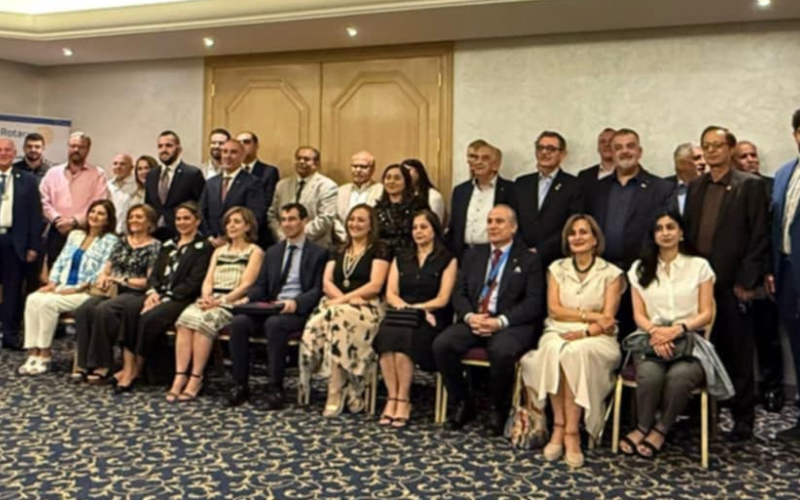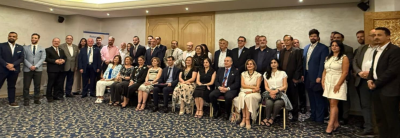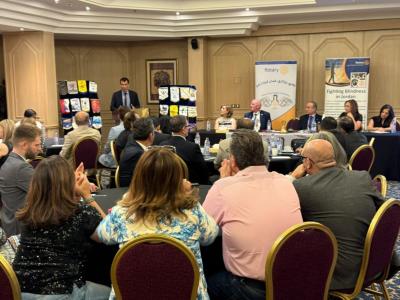EU Envoy praises humanitarian Gaza Diplomacy, and signals momentum on Palestine recognition

In a candid and far-reaching lecture delivered at the Bristol Hotel in Amman, the European Union’s ambassador to Jordan, Pierre-Christophe Chatzisavas, outlined the EU’s evolving role in global diplomacy, spotlighting growing pressure on Israel over Gaza, Europe’s unwavering investment in Jordan’s stability, and a steady march toward recognition of a Palestinian state.
Speaking at a joint Rotary (Philadelphia, Citadel, and Cosmpolitan) clubs event on July 16, Chatzisavas described 2025 as “one of the most difficult years” in modern diplomacy, marked by a breakdown of international norms, deepening global instability, and erosion of climate and development commitments.
“We have gone from bad to worse,” he said. “The principles of international law have been violated across regions. And yet, these shared challenges have brought the European Union even closer together.”
Amid the gloom, he said, there have been notable gains—particularly in Gaza, where EU diplomatic pressure helped yield a humanitarian breakthrough with Israel.
Gaza Deal: Diplomacy Backed by Leverage
Ambassador Chatzisavas previously revealed undisclosed details about a recent EU-negotiated agreement with Israel, describing it as “a story of leverage that worked.”
Following a June 23 meeting of EU foreign ministers, the European External Action Service (EEAS) was tasked with outlining a set of pressure tools in response to Israel’s violations of international humanitarian law and its obligations under the EU-Israel Association Agreement. Those discussions resulted in what Chatzisavas described as “effective political pressure.”
“We used our diplomatic channels to push for humanitarian access to Gaza—and it worked. Israel accepted our terms.”
The agreement, confirmed by Israel’s cabinet on July 9 and made public the next day, includes:
Humanitarian access: Increased delivery of food and non-food aid to Gaza.
Fuel shipments: For electricity generation and desalination.
Infrastructure rehabilitation: Including the electricity grid and water systems.
Humanitarian corridor reactivation: Through Egypt and Jordan.
Access for aid workers and UN observers: Following Resolution 2720.
Chatzisavas emphasized that enforcement is key. The EU will review Israel’s compliance every two weeks.
More significantly, he noted that the agreement “created political space,” resulting in the first joint meeting between the Palestinian and Israeli foreign ministers since 2022, alongside Arab counterparts, including Jordan’s Ayman Safadi.
Recognition of Palestine: “A Train That Has Left the Station”
In answer to my question, the ambassador made clear that France’s recent direction to recognize the State of Palestine signals an irreversible shift in Europe’s posture. “The recognition of Palestine is a train that has left the station,” he said. “France will do it. There is no going back. The real question now is: how many others will follow?”
That question will come to a head at the UN conference on July 28–29, where European alignment on Palestine recognition will be tested.
While suspending the EU-Israel Association Agreement—a so-called “nuclear option”—requires unanimity and remains unlikely, Chatzisavas pointed to a range of responses under consideration:
Trade restrictions on settlement goods.
Individual member state measures.
Potential use of trade agreements as leverage.
“We’ve already sanctioned extremist settlers. But clearly, we haven’t done enough,” he admitted.
Jordan-EU Partnership: Expanding Across All Fronts
Ambassador Chatzisavas praised Jordan as a “reliable and essential partner,” citing its regional role and internal resilience. The EU, he said, is responding with record levels of support.
The current EU assistance to Jordan averages €500 million per year, with two-thirds in grants. Under a recently launched three-year partnership agreement tied to King Abdullah’s visit to Brussels, the EU has committed €3 billion, blending loans and grants.
Areas of support include:
Public transport: A new €20 million support package for Jordan’s Ministry of Transport aims to bring systems to “European standards.”
Defense cooperation: What began as a €7.5 million support program in 2023 has grown tenfold. Jordan will soon receive advanced radar and air defense systems to secure its borders and airspace.
Water security: The EU continues to back Jordan’s flagship National Water Conveyor Project, calling it a “barometer for regional investors.”
Education and youth: 6,000 higher education scholarships have been awarded to Syrian refugees and vulnerable Jordanians, with major investments in vocational training and job readiness.
“Education remains a top priority,” Chatzisavas said, highlighting the connection between schooling, economic resilience, and regional stability.
The EU’s diversified aid portfolio, he noted, stems from both history and necessity. “We prefer to focus on a few key sectors. But in Jordan, we have a long, successful track record across the board—and we can’t just walk away.”
Looking Ahead: Trade, Jobs, and the IMEC Corridor
The ambassador also touched on long-term ambitions, including the India–Middle East–Europe Economic Corridor (IMEC), calling it “a strategic objective” that hinges on political resolution—particularly on Palestine—and deeper regional integration.
He also previewed a major EU-Jordan Investment Conference scheduled for early 2026, which aims to generate new foreign direct investment and job creation.
“The labor market remains the biggest challenge for Jordan’s youth. Investment—real, sustainable investment—is the only path forward.”
Holding Allies Accountable, Investing in Stability
Chatzisavas’s address was unusually frank for a sitting ambassador. He was both critical of global inaction and optimistic about what the EU can still achieve through diplomatic engagement and strategic investment.
“Whether in Gaza, in the halls of the UN, or here in Amman, our goal is the same: to stand by international law, to support our partners, and to make diplomacy work.”
As Jordan and the region brace for continued turbulence, that kind of message—tempered, principled, and pragmatic—was welcomed by an audience eager for signs of global leadership.













































